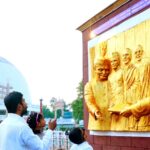The US higher education system has been the envy of the world in more ways than one. Its excellence has played a major role in sustaining America’s global leadership by projecting its soft power far and wide, attracting the best of talent to the nation’s shores and using it to retain its cutting edge in the realm of ideas and innovation.
Ivy League institutions are hubs for ground-breaking research in diverse sectors, fuelling economic growth, enhancing national security and influencing global policies. In addition, these universities serve as cultural and intellectual ambassadors for the US, shaping global perspectives on democracy, innovation and higher education.
They contribute to America’s competitive edge by providing rigorous academic training, cultivating critical thinking and emphasizing research that addresses global challenges.
So one can be pardoned for assuming that in a society and polity as sharply polarized as today’s America, these features of its elite institutions would remain unchallenged. But with Donald Trump returning to power (he is set to take oath as the next US president in early 2025) against a pushback from liberal America, the role of the Ivy League is back in political conversation.
For example, in a recent article for the Atlantic magazine, a prominent conservative commentator David Brooks argues that while Ivy League schools provide a rigorous academic environment and elite social networks, they also contribute to deepening societal divisions.
These institutions, by favouring students from wealthy backgrounds and perpetuating a particular set of social norms and values, have created an insular elite that lacks empathy for broader societal issues. In this view, Ivy League graduates often share a set of assumptions that can be disconnected from the everyday realities of many Americans.
This argument is linked to a wider debate on the reasons behind Trump’s continuing salience in US politics. Trump has managed to tap into the sentiment of a large section of the United States that is feeling unmoored from its domestic context, and as a result disenfranchised, as if their views don’t count and their voices don’t matter.
In particular, he has been extremely effective in speaking to the socioeconomic grievances of those without college degrees who have been revolting against the condescending privileged elites seen to be looking down on them.
A backlash against economic globalization, particularly in the working-class and rust-belt regions of the US, has been a central factor in Trump’s political ascent. For all its seeming advantages, globalization also led to significant job losses in industries such as steel, manufacturing and textiles, especially in the American Midwest.
As these sectors relocated to countries with cheaper labour and US communities experienced economic stagnation, the working class felt left behind.
The benefits of globalization, such as cheaper goods and increased access to international markets, were often seen as being unevenly distributed, mostly favouring large corporations, financial elites and urban centres, while labour in the US faced stagnant wages and negligible prospects of social mobility.
This divide between the winners and losers of globalization has been growing for some time now and Trump’s rise has been a manifestation of that split.
Both the Democrat and Republican party elites are viewed as culprits in this regard, pursuing policies that left a large part of the country out of the mainstream of benefits, leading to a sense of dispossession among working classes.
This was accentuated by cultural anxieties, particularly around immigration, national identity and the changing demographic profile of the US. As immigration and cultural exchange got a fillip, some Americans—especially in rural and industrial regions—felt that their traditional values were at threat.
Ironically, the Democrats, who have traditionally been America’s party of the working class, are viewed today as a meritocratic elite who not only look down on middle America, but increasingly also lack the vocabulary to have an honest conversation with a large part of their own country.
These trends are not unique to the US. The wider West is facing this challenge and some strands of this debate are also visible in the Indian democratic contest.
But it is the growing focus on the role of America’s elite higher-education institutions in shaping this divide that is most illuminating. The idea that ‘good education’ would lead to a better sense of community is so ingrained in our understanding that we often fail to examine what ‘good education’ is resulting in.
In the case of the US, quality education seems to be perpetuating social inequality instead of fostering a more diverse and inclusive intellectual and leadership culture.
As India struggles to give coherence to its higher-education landscape and as our own elites remain mesmerized by the Ivy League, we should carefully absorb lessons from the American experience and keep our focus on a more inclusive approach to higher education, one that broadens access and fosters a greater sense of social responsibility among the highly educated elite.
The author is professor of international relations, King’s College London, and vice president for studies at Observer Research Foundation, New Delhi.
#rise #Trump #presents #paradox #higher #education



